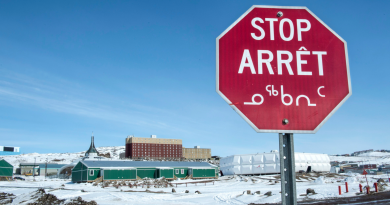Federal narwhal tusk ban lifted in most of Nunavut
 All communities except Grise Fiord can once again export the tusks legally
All communities except Grise Fiord can once again export the tusks legally
The Department of Fisheries and Oceans (DFO) has lifted the international trade ban on narwhal tusks in all Nunavut communities except one, Grise Fiord, a small Inuit hamlet in the Qikiqtaaluk Region in the territory of Nunavut, Canada.
The federal government put the ban in place in 2010.
Nunavut Tunngavik Incorporated (NTI), an Inuit land claim organization in Nunavut, challenged the ban. In 2011, NTI and the federal government came to an agreement to remove the ban from four of the 17 Nunavut communities. All the other communities can now resume exporting the tusks.
Grise Fiord was not been included in this agreement because the federal government said there is no scientific evidence of narwhals in the area surrounding the community.
James Eetoolook, NTI’s president, said he’s happy about the decision, which is retroactive to 2010.
He said they “look forward to continue to work with DFO, and the community of Grise Fiord to remove trade restrictions on narwhal stocks through scientific and traditional knowledge data gathering”.
He said the department based the ban on outdated narwhal population data. He added that the ban had a significant impact on Nunavut hunters.
“The annual trade of tusks is between 250 and 500 tusks a year. This translates to roughly $900,000 to $1.5 million that goes directly to the Inuit of Nunavut, the hunters.”
The narwhal population is estimated at about 86,000 in the territory. Of that, about 700 of the animals are harvested each year.
For more stories from CBC News, click here



